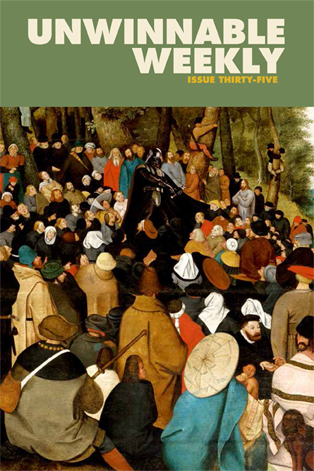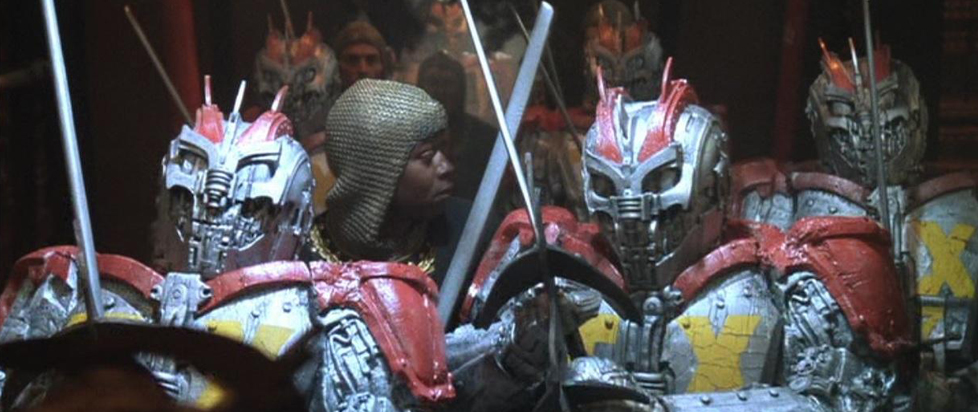
The Tyranny of the Fan
The Burnt Offering is where Stu Horvath thinks too much in public so he can live a quieter life in private.
———
The following is a reprint from Unwinnable Weekly Issue Thirty-Five. If you enjoy what you read, please consider purchasing the issue or subscribing.
———
1
 On October 12, 1944, more than 30,000 bobby soxers ran riot in New York City. The reason? Frank Sinatra. At the height of his early fame, he was performing several times over the course of the day, but the audiences weren’t leaving after their alotted show. Fans sat for hours, refusing to leave as more fans arrived for subsequent shows. They wouldn’t even get up to go to the bathroom – as this Guardian article describes, the floor of the theater was left rank with urine. Everyone wanted Frankie. As matters escalated, the police were called in to defuse the situation.
On October 12, 1944, more than 30,000 bobby soxers ran riot in New York City. The reason? Frank Sinatra. At the height of his early fame, he was performing several times over the course of the day, but the audiences weren’t leaving after their alotted show. Fans sat for hours, refusing to leave as more fans arrived for subsequent shows. They wouldn’t even get up to go to the bathroom – as this Guardian article describes, the floor of the theater was left rank with urine. Everyone wanted Frankie. As matters escalated, the police were called in to defuse the situation.
This wasn’t the first time fandom had reached an irrational fever pitch. The funeral of silent film actor Rudolph Valentino in 1926 drew an estimated 100,000 mourners to the streets of Manhattan. An all-day riot eventually broke out, requiring over 100 mounted police to contain.
Even further back, in 1774, the novel The Sorrows of Young Werther catapulted Johann Wolfgang von Goethe to overnight fame and inspired “Werther Fever,” in which young men dressed and acted like the protagonist, with some even reportedly copying his suicide.
Of course, in the years since Sinatra’s Columbus Day Riot, there’s been no shortage of zealous fan phenomena: Elvis, the Beatles, Apple products, the occasional car-flipping after a championship game. Trekkies trek, cosplayers cosplay and sports fans ritually adorn themselves in the colors and logos of their favored teams.
2
I’ve known Gary for years, since before he was in a band. I tweet at him the same way I tweet at anyone: short, doofy exchanges about conspiracy theories or Dungeons & Dragons. No one cares when I do that with literally everyone else I talk to on Twitter.
The difference is that Gary has a legion of fans and over a million of them follow him on Twitter. Every time he has tweeted with my handle in the mentions, it has gotten hundreds of retweets. By the time I refresh my feed to see a reply, his tweets will have dozens of favorites – even if it is something as innocuous as “Hey dude.” The first time this happened, I got so many notifications it killed my phone battery within about 15 minutes.
They’re straining for contact, of course. Every tiny interaction is a brush with on high, a legitimization, a rise in status. For them, Gary’s attention is a kind of currency.
I can’t imagine what it does to Gary’s head. When I first witnessed the surge, it was overwhelming, like a looming tidal wave of bodies, of voices wanting to communicate, reinforcing, fawning. They’re so vast and so loud that everything coherent is drowned out in a senseless roar.
We often talk about how social media has created a level playing field of connection. I am increasingly suspicious of this. I think humanity, on a fundamental level, isn’t supposed to interact in such great numbers, with so few boundaries. It taxes us in ways we don’t yet understand. We rise up as rabid armies in the service of unwitting generals, and we march with the slightest provocation, razing everything in sight, like locusts, like fire.
3
I have a special appreciation for culture and its artifacts. I follow careers. I seek knowledge in a number of areas and genres that appeal to me. Sometimes I will discover something that excites me to the exclusion of all else. Sometimes I will revisit something I was fond of only to find it wanting. I form opinions, revise them, discard them. I learn new things and use them to expand my perspectives.
Take Foucault’s Pendulum, by Umberto Eco – my favorite novel for many years. Every time I read it, I discover new things because every time I read it, I am in a different person. I know new things, I’ve forgotten old ones. Someday, I reckon I will read something that will become my new favorite novel. When that happens, it won’t diminish the fact that Foucault’s Pendulum was incredibly important to my thinking.
Because of that book, I’ve also read just about everything else Eco has written. Some of it is great. Some of it, like The Prague Cemetery, is awful. My opinion doesn’t affect Eco in the slightest and has even less impact on the works themselves. My dislike of The Prague Cemetery leaves no indelible mark upon the text. I don’t even necessarily think it was a bad book – it just didn’t have any useful ideas to give me when I happened to sit down to read it.
It strikes me as unhealthy, this mania that overtakes the enthusiast crowd. I have never liked anything the way fans like these like things.
Or have I?
4
I grew up with Star Wars. In many ways, it was the yardstick by which I measured, well, just about everything. Star Trek’s aliens weren’t as weird. Cobra Commander wasn’t as scary as Darth Vader. Not even the red stripe on A-Team’s van could make it as cool as the Millennium Falcon. I watched those movies over and over again and loved every second of them. Even the fucking Ewoks.
I devoured every comic book, videogame, novel and RPG source book I could get my hands on. I have a huge database of Star Wars minutiae locked in my grey matter and yet, it was always easy to set aside some Star Wars material as obviously bad: The Droids cartoon, the Ewok movies, The Courtship of Princess Leia, the god awful Christmas Special.
Maybe you can guess where this is going. 1999. The release of The Phantom Menace, the first in what had to be the greatest prequel trilogy of all time. I cannot adequately describe the marriage of anticipation and naked excitement that grew exponentially from the first rumor to the casting announcements to the trailers to the toy releases. It all culminated in taking my seat in the theater with more than a dozen friends on opening night. I have never had a movie-going experience like that. It was glorious.
The Phantom Menace was a terrible movie, of course. Yet most of us who stumbled out of that theater that night – smart, well-educated college students, mostly studying in the arts – had no idea. We loved The Phantom Menace. We were in an altered state where our fandom had overridden the evidence of our senses. We hadn’t watched the atrocious, rambling, pointless movie George Lucas had made, we had seen the adventure we had been waiting for almost our entire lives. It was an illusion, a delusion. It didn’t last long.
By the start of the next week, I was starting to realize just how badly I had been duped. Some of my friends sank into denial about the movie. Others got angry – this was the birth of George Lucas, destroyer of childhoods. I was embarrassed, though. It wasn’t George Lucas who had bamboozled us. We had pulled the wool over our own eyes.
5
Most dictionaries consider the word fan to be an abbreviation of fanatic. According to Merriam-Webster, fanatic means, “marked by excessive enthusiasm and often intense uncritical devotion.” This is further derived from the Latin word fanaticus, which is an adjective meaning frenzied. There is an underlying religious connotation as well – fanaticus is rooted in the word fane, a term for a temple or shrine.
In the modern vernacular, a fan is a person who is enthusiastically devoted to some aspect of entertainment, be it a sport team, a band, a franchise or a person. It is not shorthand for merely liking something. Being a fan implies something deeper than ordinary enjoyment.
Just look at some of the synonyms of fan: fiend, junkie, freak, hound, nut, addict. Even words that lack an obvious negative connotation feel subservient. An enthusiast was originally a person possessed by a divine spirit, their individual will suppressed; and what is a supporter if not a footstool?
6
Back in middle school, all my friends liked Iron Maiden. A lot. We spent an alarming amount of time listening to their music, trying to suss out the inspiration for their lyrics and discover the hidden details in the album artwork.
One friend, though, liked Iron Maiden far more than the rest of us. Harvey was a bit of an outlier in the group, not so much a friend as a tolerated (and near-constant) presence. Harvey liked Iron Maiden as if his life depended on it. He had posters and t-shirts and videos – none of this is inherently strange, but it does serve to illustrate a level of investment that I didn’t share. What was weird? He loved all their music unconditionally.
One day, the two of us were walking home from school and I mentioned off-handedly that I didn’t like the 1986 album Somewhere in Time. Harvey stopped dead in his tracks and looked at me as if I had just confessed to eating babies.
“But…what about ‘Alexander the Great?’” he sputtered.
I shrugged. “I like that riff in the beginning of ‘Wasted Years,’” I said, trying for a conciliatory tone but not caring much. I was only a block from home, so I was sure the conversation couldn’t escalate to murder in such a brief span of time.
Harvey went on, listing the merits of “Stranger in a Strange Land,” “The Loneliness of a Long Distance Runner” and other mediocre songs I’ve never bothered to learn the titles of. He pleaded with me to reconsider, to borrow his copy, to give the album another shot.
When I begged off, he accused me of not liking Iron Maiden at all.
7
I know a lot of people who still harbor the virus of Star Wars fandom. They see the recent purchase of Lucasfilm by Disney as a chance for Star Wars redemption. They chant: This time it will be good! Look at what they have done with the Marvel superhero movies! Look how good the Rebels cartoon is! J.J. Abrams can do it! Rian Johnson will make it happen!
I do not care. After The Phantom Menace, my interest in Star Wars plummeted. I played a few videogames, read some comics and, after a while, just drifted on to other things. I have no real desire to see the new films because, in many ways, I am simply not interested in any Star Wars, even good Star Wars, if George Lucas isn’t involved. I can’t see this new foray as anything other than very high budget fan fiction.
Sure, I used to love the stuff. I still do, but in a remote way. I love that I loved it. It’s like an ex – thanks for the memories, but no, we aren’t going to keep hanging out, sorry.
Star Wars fans usually interpret this lack of interest uncharitably. Reactions run along a spectrum: I have changed in some fundamental, bullshit way; I’ve sold out, like a band that dares to make a decent living off their music. I am lying, I really do like Star Wars, but I am trading my childhood for the cool cred of detachment. I never liked Star Wars in the first place, not like you, you true believer, you.
This echoes Harvey’s weird bargaining. In a fan’s mind, there is minimal separation between themselves and the thing they adore. To dismiss the object of fetishization is a rebuke, not of the thing, but of the fan for liking the thing. A fan doesn’t enjoy a thing on its own merits. They seek to form a consensus opinion about things independent of the merits. Fans seek other fans to reinforce their fandom, fostering extremism as they attempt to outdo one another. They create rigid systems for the things they love, putting them in carefully labeled boxes and worshiping, exalting, preserving them, as if in amber.
8
To be a fan is to become willingly blind, to place constraints where there should be none. A fan cannot truly enjoy a thing on its own merits. A fan just measures it against a mix of nostalgia and zeal, looking ever inward.
A 9th century Buddhist master named Linji Yixuan famously said “If you meet the Buddha, kill the Buddha…If you meet your parents, kill your parents…Then, for the first time you will gain emancipation, will not be entangled with things, will freely pass anywhere you wish to go.”
Linji wasn’t talking about committing real violence, but rather exhorting his students to exterminate their preconceived notions, the ideas from other people and the machinery of society that pollute your thinking and prevent you from seeing the world as it is.
Fandom, no matter how simple, is a series of rules and preconceptions. Fandom is about devotion. We can only learn and appreciate something if we are also able to criticize and discard it. For a fan, this is impossible. There is only the past, the preservation of what once was, the slavish fervor of ever-narrowing focus, the combative enforcement of custom that proves Siddharta’s words: “The root of suffering is attachment.”
9
It is going to get worse.
Fandom is self-devouring. It digests all other things, makes them part of the chosen whole. Han Solo fights Deadpool. Characters from Pixar movies wear superhero costumes. Every character ever sits on the Iron Throne of Westeros. Everything must be reduced. Everything different must be recognizably the same.
Fandom keeps metastasizing. Gamergate calls itself a consumer revolt, but it is actually a cancerous fan culture run rampant, trying to enforce its own orthodoxy. They represent the true gamers, the pure gamers. Everything else is heresy.
Gamergate isn’t over. It will never end. I do not want to see what comes next.




